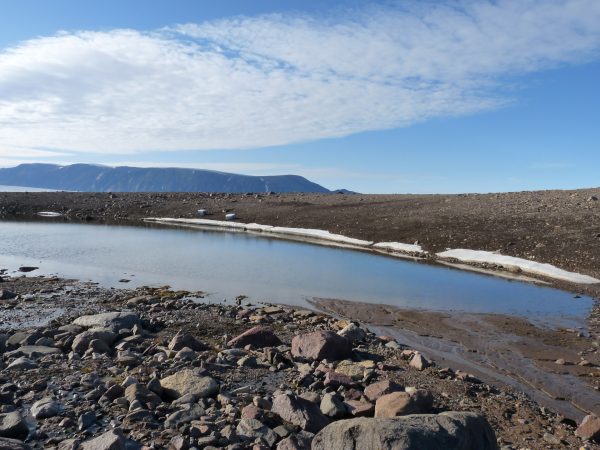TORONTO, Tuesday, July 24, 2018 – Mercury can show up in pristine High Arctic environments from as far away as China, and as the Arctic warms, more of that mercury can find its way into lakes, endangering people and wildlife, a York University geography professor has found.
“Mercury in certain forms is highly toxic to humans and wildlife. Since it is transported atmospherically over long distances, mercury produced in industrial centers in North America, Europe, and Asia can end up in Arctic food webs, even without any local sources of mercury,” said lead researcher Jennifer Korosi, an assistant professor in the Faculty of Liberal Arts & Professional Studies at York University.
Korosi and her team used lake sediment cores to track the history of how mercury was, and continues to be, deposited in eight lakes on Cape Herschel (Ellesmere Island) in the Canadian High Arctic. Like the pages of a book, these cores allow researchers to track the history of mercury pollution over the last several hundred years.
“Our results indicate that, in some cases, climate warming does enhance the transport of mercury to lakes,” said Korosi. “But even lakes that have showed a delayed response to climate warming still exhibit a strong post-industrial signal of mercury enrichment, and no recovery following recent controls on mercury emissions.”
The concern is that the dramatic changes occurring in the Arctic in response to climate warming will cause higher amounts of mercury to be transported into aquatic ecosystems, where it can be converted into the toxic methylmercury form.
As Arctic ecosystems warm, there is more growth of plants, moss and algae in the lakes and the surrounding area that will bond with mercury, causing more of it to enter the aquatic system. This would delay the benefits of national and international policy agreements aimed at reducing mercury pollution in the environment.

A cool Arctic lake, Cape Herschel. Photo by study co-author Katie Griffiths, McGill University
The researchers looked at four distinct climate categories: lakes that responded early, around 1850, to a warming Arctic; those that were buffered from those early effects due to shade cover or other site-specific factors and didn’t respond to climate warming until about 1950; lakes that were always warmer than the norm for the Arctic; and lakes that have not yet been impacted by climate change, usually because they’re at a high elevation.
“By tracking mercury deposition histories in Arctic lakes that responded at different times to climate warming, we can determine whether the combination of climate warming impacts and long-range transport of industrial mercury emissions results in higher mercury concentrations in Arctic lakes than long-range mercury transport on its own,” said Korosi.
The study is published in the journal Environmental Pollution.
-30-
About York University
York University is known for championing new ways of thinking that drive teaching and research excellence. Our students receive the education they need to create big ideas that make an impact on the world. Meaningful and sometimes unexpected careers result from cross-discipline programming, innovative course design and diverse experiential learning opportunities. York students and graduates push limits, achieve goals and find solutions to the world’s most pressing social challenges, empowered by a strong community that opens minds. York U is an internationally recognized research university – our 11 faculties and 26 research centres have partnerships with 200+ leading universities worldwide. Located in Toronto, York is the third largest university in Canada, with a strong community of 53,000 students, 7,000 faculty and administrative staff, and more than 300,000 alumni. York U's fully bilingual Glendon campus is home to Southern Ontario's Centre of Excellence for French Language and Bilingual Postsecondary Education.
Media Contact:
Sandra McLean, York University Media Relations, 416-736-2100 ext. 22097, sandramc@yorku.ca

